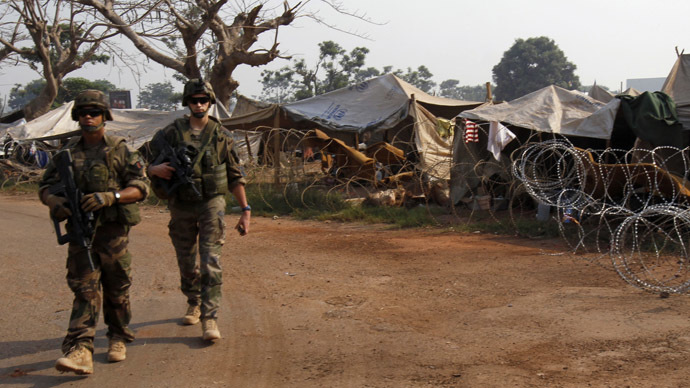‘Horribly possible’: More child-rape cases by peacekeepers could emerge – UN

Following shocking revelations of child sexual abuse by French peacekeeping troops in the Central African Republic, the UN has warned that it is “horribly possible” that information about more such cases may emerge.
As the investigation continues into the alleged French crimes and troop misconduct, UN human rights spokesman, Rupert Colville admitted that “it is possible, it’s horribly possible,” that further inquiries will reveal more unreported instances.
The French investigation followed numerous reports of sexual exploitation and abuse of children by the French military before the establishment of MINUSCA – the United Nations peacekeeping operation in Central African Republic. The period under investigation is December 2013 through June 2014. Colville called the allegations “abhorrent” and “utterly odious.”
READ MORE: 'Rape and sodomy': Leaked UN report details French soldiers’ abuse against African boys
Earlier this week, the Guardian published a leaked UN report exposing a rape case at a center for internally displaced people at M’Poko Airport in CAR’s capital Bangui. It alleges, based on witnesses testimony that French peacekeeping forces instead of protecting children, sodomized starving and homeless boys, some as young as nine. The UN spokesman on Friday admitted that “only the French can do this investigation ... fully.”
In the meantime Paula Donovan, from the AIDS-Free World said children interviewed also accused soldiers from Chad and Equatorial Guinea of molesting kids. She also accused the UN of trying to cover up the scandal.
“You can say it was a UN cover-up,” Paula Donovan, co-director of the AIDS-Free World, told IBT.
“The UN’s disturbingly self-defensive instincts are all about how can we protect the bureaucracy, not how can we protect and treat the victims and prevent any instance of future abuse in these particular locations or in any other locations around the world.”
She pointed out that UNICEF and the Commission for Human Rights, after interviewing the first victims, did nothing to apprehend those responsible, despite knowing certain physical traits of the assailants.
“There’s no indication of an intervention on the part of the interviewers to ensure that the authorities apprehended the perpetrators described by the very first victims they interviewed, and no indication that the children were referred immediately to professionals who could offer them treatment,” said Donovan.
In regards to soldiers from Chad and Equatorial Guinea, the UN said on Friday that it didn't know whether the accusations against these nations are being pursued. The world organization did express hope that the French probe might cover it.
“This is incredibly important, not just as a matter of accountability, but also as deterrence,” the UN human rights office said Friday. “There have been far too many incidents of peacekeeping troops engaged in such acts, whether within UN peacekeeping forces, or – as in this case – forces that are operating independently.”
As for a possible UN cover-up, on Thursday, the United Nations announced an internal investigation into the handling of the CAR incident, including the manner in which the “confidential preliminary findings were initially communicated to external actors, and whether the names of victims, witnesses and investigators were conveyed as part of that document.”












